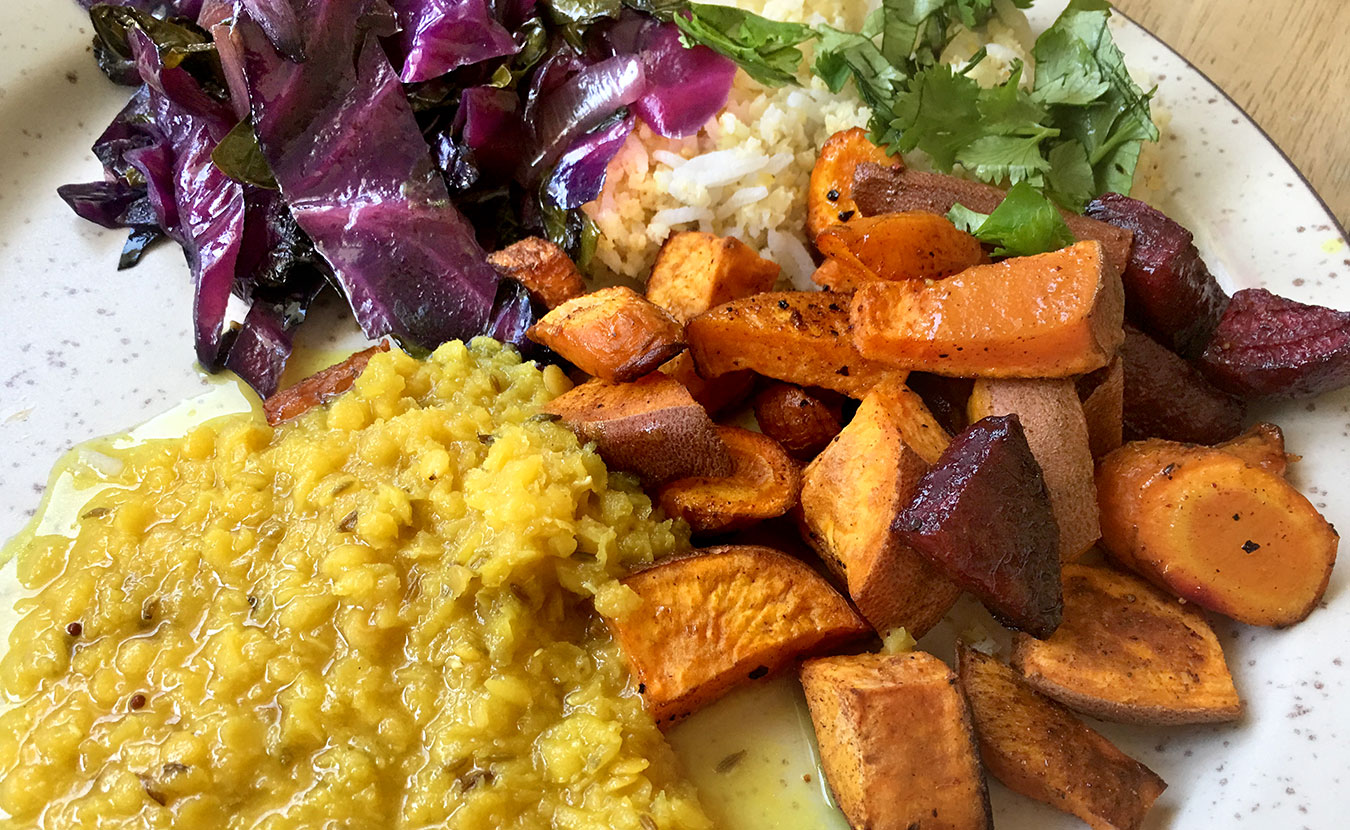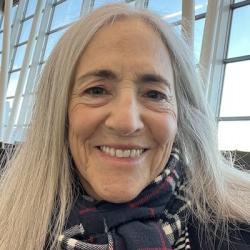A cozy house sits on a hilltop right here in town. In the cheerful kitchen of that cozy house, Kristin Londergan chops a heavy purple cabbage just pulled from her lush backyard vegetable garden. Coconut oil heats in a well-seasoned cast-iron skillet, where the cabbage will slowly sauté. Meanwhile, aromatic root vegetables roast in the oven and the heady scent of cinnamon, nutmeg, and cloves wafts through the house. Basmati rice and millet softly steam together in the rice cooker. And ground cumin and turmeric warm in a bath of ghee on the stove. The spices will impart a pungent taste and a bright yellow stain to the dal.

Londergan has put her own Bloomington-inspired spin on the ancient practice of Ayurveda. | Photo by Ruthie Cohen
Lunch is served.
This meal is the result of Londergan’s Ayurvedic practice in all of its colorful, bountiful, and delicious glory. A feast for the eyes, a boon for your gut, a balm for your spirit.
Ayurveda (“ayur” means life, “veda” means knowledge of science) is a 5,000-year-old holistic practice that began in India. Both physical and spiritual, Ayurveda offers its practitioners a guide to health. It respects subtle and profound changes within our bodies (each with their unique makeup, or “dosha”), as well as in the external world (think seasons), and strives to create balance.
“Being healthy,” says Londergan, “means paying close attention to right thinking, diet, lifestyle, and the use of herbs. Ayurveda is a science based on personal responsibility.
“By focusing on lifestyle changes such as when, how, and what we eat; when and how we sleep; how we exercise; and when and how we perform our daily activities, we find more ease day to day.”
Through extensive training and much self-study, Londergan, 33, a health educator and certified Ayurvedic practitioner, has put her own Bloomington-inspired spin on this ancient practice. “It’s western herbalism,” she smiles. “My own blend of Ayurveda, yoga for stress relief, and an emphasis on wholesome nourishing foods, fermented foods and broths, and as many local products as possible.
“I lead people to ownership of their bodies and what works for them,” she continues. “I empower people to do what feels good, to find clarity and ease, to embrace a better relationship with food and with their bodies.”
Her website has insights and recipes for each season. She offers individual consultation packages as well as “bliss therapies,” like warm oil massages and facials.
Here are two recipes from that colorful lunch. They are intentionally suited to the dry and cooler autumn months when our bodies crave warm, cooked, moist, nourishing foods. Gotta balance that dosha!
Roasted Root Veggies
5-6 assorted root vegetables (such as sweet potatoes, beets, turnips, and parsnips — you could also include butternut squash)
3 tablespoons oil (olive or coconut), butter, or ghee
1 tablespoon grated ginger root
Generous sprinkle of cinnamon, nutmeg, clove, salt, and pepper
Preheat oven to 425°F. Wash veggies, peel if desired, and cut into one-inch cubes. Place in a mixing bowl and add oil and spices to coat. Pour into roasting pan or rimmed cookie sheet and bake for 45 minutes or until tender and slightly caramelized. Adjust seasonings and serve.
Red Lentil Dal
1 tablespoon ghee or coconut oil
1/2 teaspoon cumin powder
1/4 teaspoon mustard seed
1-2 bay leaves
1/2 cup red lentils, rinsed and drained
1 1/2 cups water or broth
1/2 teaspoon turmeric powder
Salt, to taste
Heat ghee or coconut oil in a medium pot. Add cumin, mustard seed, and bay leaves. Allow them a minute to “pop” so that their properties are well absorbed into the ghee or oil. Add lentils and water or broth. Bring to a boil, then reduce heat to a simmer. Add turmeric powder and a dash of salt. Cook until soft, about 20 to 30 minutes, so that most of the liquid is absorbed. Discard bay leaves. Add additional salt, to taste.


